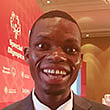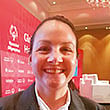People with intellectual disability still get inadequate care
10,000 community workers must be trained to care for 11m in 20 developing countries
Abu Dhabi: There is increasing awareness about the rights of people with intellectual disabilities, yet millions of them around the world still suffer disproportionately due to the lack of access to quality health care.
At the Special Olympics Global Inclusive Health Forum in the capital today (March 13), top health care officials and philanthropists issued an urgent call for global action, including financial resources, so that 11 million people with intellectual disabilities in 20 developing countries can get the care they need by 2020.
“More than $9 million (Dh33 million) is needed over the next five years to train 10,000 community health workers so that people with intellectual disabilities in developing countries are not left invisible within the health system,” said Javier Vasquez, vice president of Special Olympics health programmes.
“Without this kind of training, people with intellectual disabilities will continue to receive inadequate health care, human rights violations and reduced life expectancy. We need the help to save lives,” Vasquez said.
He was speaking at the Forum, organised ahead of the Special Olympics 2019 that is set to kick off in Abu Dhabi Thursday (March 14). The nearly weeklong international sporting event will see 7,500 people with determination from 197 countries competing in 24 categories.
About 15 per cent of the world’s population lives with some form of disability, including Down syndrome, autism and Turner Syndrome, of whom 2-4 per cent experience significant difficulties in functioning, according to World Health Organisation. Their health concerns are often ignored, especially dental troubles and vision impairment. They are also three times as likely to end up with heart disease, and twice as likely to become obese, compared to those without disability.
Data collected by the Special Olympics through its Healthy Athletes Screening Programme has therefore highlighted the need for trained community workers to ensure sustainable access to health care. Officials also urged governments to collect sufficient data to drive policy decisions geared towards people with intellectual disability.
“There is still great discrimination against people with intellectual disability, fuelled by misunderstanding. People haven’t met, and doctors haven’t encountered the full sense of humanity and giftedness of people of determination. So we are here to invite health care professionals to be part of the change. Health care should be a place where mothers and fathers can discover the enormous potential of their children of determination,” Dr Timothy Shriver, chairman of the Special Olympics, told Gulf News on the sidelines of the Forum.
The Forum also saw seven organisations and individuals honoured for their role in promoting inclusive health around the world, as part of the Health Leadership Awards by the Golisano Foundation. The Foundation invested $37 million (Dh136 million) in 2015 in order to support the Special Olympics Healthy Communities screenings and health care programmes.
Golisano Health Leadership Award winners
Lions Sight First Eye Hospital in Kenya: The hospital has provided follow-up care for Special Olympics athletes in Kenya, with more than 1,000 eyeglasses donated and 15 surgeries done in the past five years.
Dr Ashok Dhoble from India: The secretary general of the Indian Dental Association has collaborated with the Special Olympics, and signed an agreement to provide year-round access to oral health care for the country’s athletes and caregivers.
Hua Dong Hospital in China: The hospital has formed a medical volunteer team to support Special Olympics athletes with health screenings, and has already provided 12,000 screenings in 17 cities.
Belgium Dentists Collaboration: The group, which has partnered with four major universities in the country, aims to achieve better oral health outcomes for people with intellectual disabilities.
Dr Dorisel Ferreira from Paraguay: The director of the third health region in the Paraguayan Ministry of Public Health and Social Welfare has recruited staff at the Ministry to volunteer at Special Olympics screenings, and also procured the equipment necessary for them.
Dr Kamal Bani-Hani from Jordan: The president of the Hashemite University works with students in sport science, special education and medicine to volunteer within the Special Olympics Jordan’s health and fitness programmes.
Dr Peter Seidenberg from the USA: The family and sport medicine physician at Penn State Sport Medicine Collge has worked with Special Olympics Pennsylvania to create a directory of providers who will accept athletes in need of follow-up care.
What people of determination say
Good health gives everyone confidence and courage, and this is why people with determination should have a right to quality health care. With the right care, we can dream big, work hard and inspire others.

I would like to see more medical professionals take a keener interest in their patients. We might look normal and our disability may be largely invisible, but if doctors are not trained to care for people with intellectual disability, we will remain the gap group.




